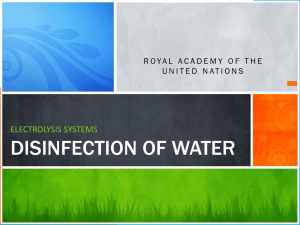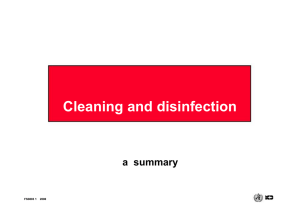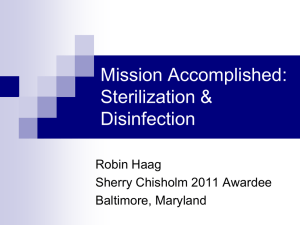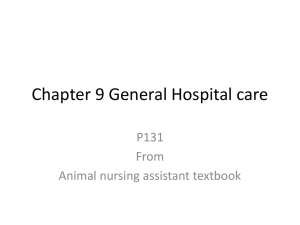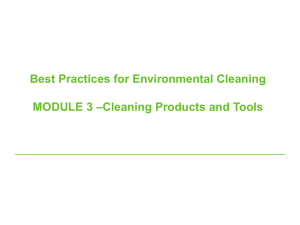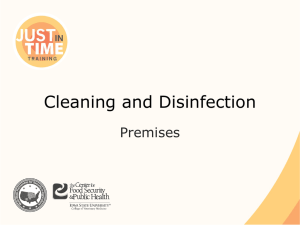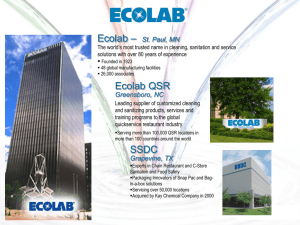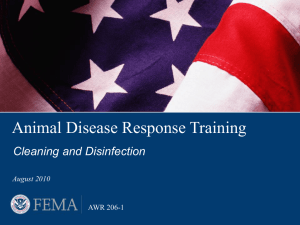Cleaning and Disinfection: Vehicles
advertisement
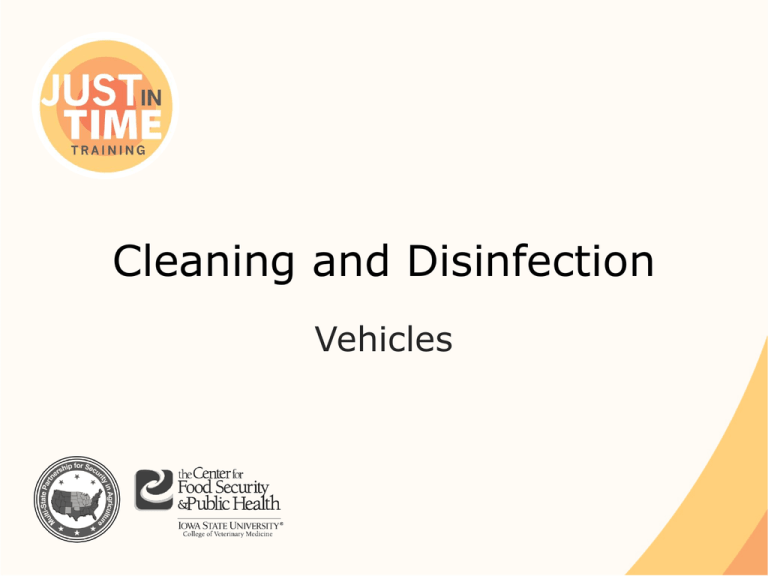
Cleaning and Disinfection Vehicles Overview ● Any vehicle used on infected premises or with infected animals – Trailers, feed trucks, milk trucks, carcass transporters – Heavy machinery used during response ● Can be difficult Just In Time Training Cleaning and Disinfection: Vehicles Site Selection ● Adjacent to entrance ● Flat terrain ● Impermeable surface ● House components – C&D equipment – Water supply – Waste water containment Just In Time Training Cleaning and Disinfection: Vehicles Preparation ● Area two times the largest vehicle ● Holding area for disinfectant contact time ● Berming materials to contain fluid ● Drain area by sump pump into holding tank for disposal Just In Time Training Cleaning and Disinfection: Vehicles Disinfectant Preparation ● Use according to product label ● Only EPA-registered or approved products ● Prepare fresh solutions – Old solutions may have reduced efficacy ● Test kits can help check concentration Just In Time Training Cleaning and Disinfection: Vehicles Biosecurity Work Zones Just In Time Training Cleaning and Disinfection: Vehicles Basic Protocol ● Systematic manner ● Cleaning – Dry clean – Wash – Rinse and Dry ● Disinfection – Application – Contact time – Rinse and Dry Just In Time Training Cleaning and Disinfection: Vehicles Vehicle Exterior: Dry Clean ● Remove visible organic material – Use brooms, shovels, brushes – Don’t forget wheel wells ● Dispose in biosecure manner ● Remove items from interior Just In Time Training Cleaning and Disinfection: Vehicles Vehicle Exterior: Wash and Rinse ● Wash with detergent and warm water ● Presoaking or degreaser for accumulations of urine/feces ● Use high pressure sprayer with caution ● Rinse with clean, warm water ● Allow to sit 5-10 min to drip off residual water Just In Time Training Cleaning and Disinfection: Vehicles Vehicle Exterior: Disinfect ● Apply disinfectant – Low pressure spray, scrub brushes – EPA-registered product – Non-corrosive product – Allow necessary contact time – Reapply as needed – Rinse with clean, warm water ● Allow vehicle to dry thoroughly Just In Time Training Cleaning and Disinfection: Vehicles Vehicle Interior ● Remove non-fixed items ● Sweep away gross debris ● Wash, rinse and dry ● Wipe EPA-registered disinfectant – Keep surfaces “wet” during contact time ● Allow interior to dry Just In Time Training Cleaning and Disinfection: Vehicles C&D Equipment ● Equipment used for C&D tasks must also be – Cleaned and disinfected before reuse – OR – Properly disposed of Just In Time Training Cleaning and Disinfection: Vehicles Safety ● Chemical Hazards – Skin, eye, respiratory irritation ● Physical Hazards – Slips, trips, falls – High pressure sprayer ● Personal Protective Equipment (PPE) – Gloves, masks, eyes Just In Time Training Cleaning and Disinfection: Vehicles Environmental Hazards ● Runoff must be avoided – Infectious material – Chemical solution ● Toxic to aquatic organisms ● Further spread of pathogens Just In Time Training Cleaning and Disinfection: Vehicles References ● https://fadprep.lmi.org ● USDA APHIS. FAD PReP NAHEMS – Highly Pathogenic Avian Influenza Standard Operating Procedures: Cleaning and Disinfection. February 2010. – Foot-And-Mouth Disease. Standard Operating Procedures: Cleaning and Disinfection. February 2010. – NAHEMS Guidelines: Cleaning and Disinfection. June 2011. Just In Time Training Cleaning and Disinfection: Vehicles Acknowledgments Development of this presentation was by the Center for Food Security and Public Health at Iowa State University through funding from the Multi-State Partnership for Security in Agriculture Author: Glenda Dvorak, DVM, MPH, DACVPM


